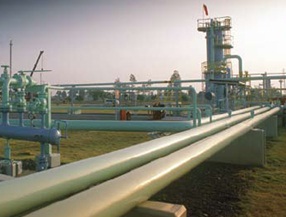Thailand's PTT to boost LNG imports in 2017 as local fields fade

Photo courtesy of PTT.
Thailand's largest energy firm, PTT, plans to import at least 5 M tons of LNG in 2017, up from 3 M tons this year as local gas production fades.
State-controlled PTT expects to conclude in September talks with several suppliers, including Royal Dutch Shell and BP, to buy LNG under long-term contracts, chief executive Tevin Vongvanich told a news conference Thursday.
Thailand, which uses natural gas for nearly 70% of its power generation, has become increasingly reliant on LNG imports as its own domestic gas fields are slowly being depleted. PTT is the nation's sole gas provider.
"As domestic resources decline, we are at the last phase of gas production," Tevin said, adding that PTT aimed to buy at least 3 M tons of LNG via long-term contracts, as well as making purchases in spot markets.
Thailand currently has a long-term contract with Qatar for supplies of up to 2 M tons of LNG per year.
Hit by the decline in global oil prices, PTT has cut its 2016 investment budget to $1.25 B and will focus on more infrastructure, including LNG terminals and gas pipelines, Tevin said.
PTT is in the process of doubling the intake capacity of its 5 MMtpy LNG import terminal at Map Ta Phut in the country's east, which is expected to be completed in 2017, Tevin said.
To boost revenue from non-oil businesses, PTT is seeking partners to open budget hotels at its petrol stations in Thailand and to open more coffee outlets at facilities in neighboring Southeast Asia, he said.
The company also plans to spend about $1.5 M - $3 M supporting clean energy technology, chief financial officer Wirat Uanarumit said.
PTT expects to continue to make profit in the second half of the year, with lower feed gas costs supporting its core gas business, Wirat said.
Unlike the first half, PTT has no major shutdowns planned for the latter half of the year, he said.
On Monday, PTT reported a 4.8% rise in Q2 net profit as its strong gas business outweighed the weak performance of its petrochemical and refining businesses.
Reporting by Khettiya Jittapong and Manunphattr Dhanananphorn; Editing by Joseph Radford

- RWE strengthens partnerships with ADNOC and Masdar to enhance energy security in Germany and Europe
- TotalEnergies and Mozambique announce the full restart of the $20-B Mozambique LNG project
- Five energy market trends to track in 2026, the year of the glut
- Venture Global wins LNG arbitration case brought by Spain's Repsol
- Trinity Gas Storage reaches FID on Phase II expansion



Comments